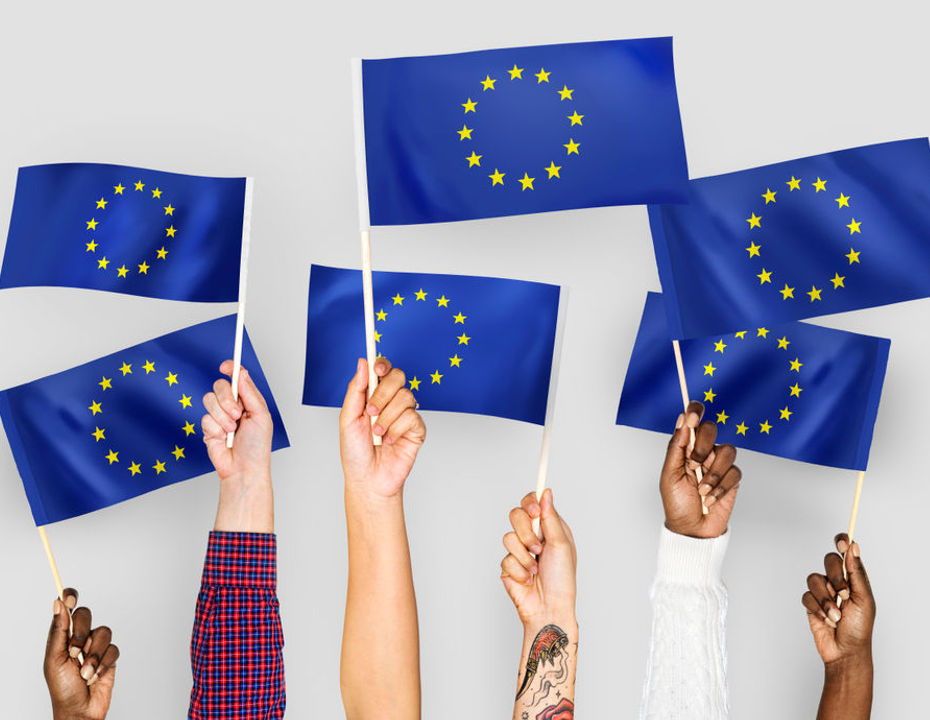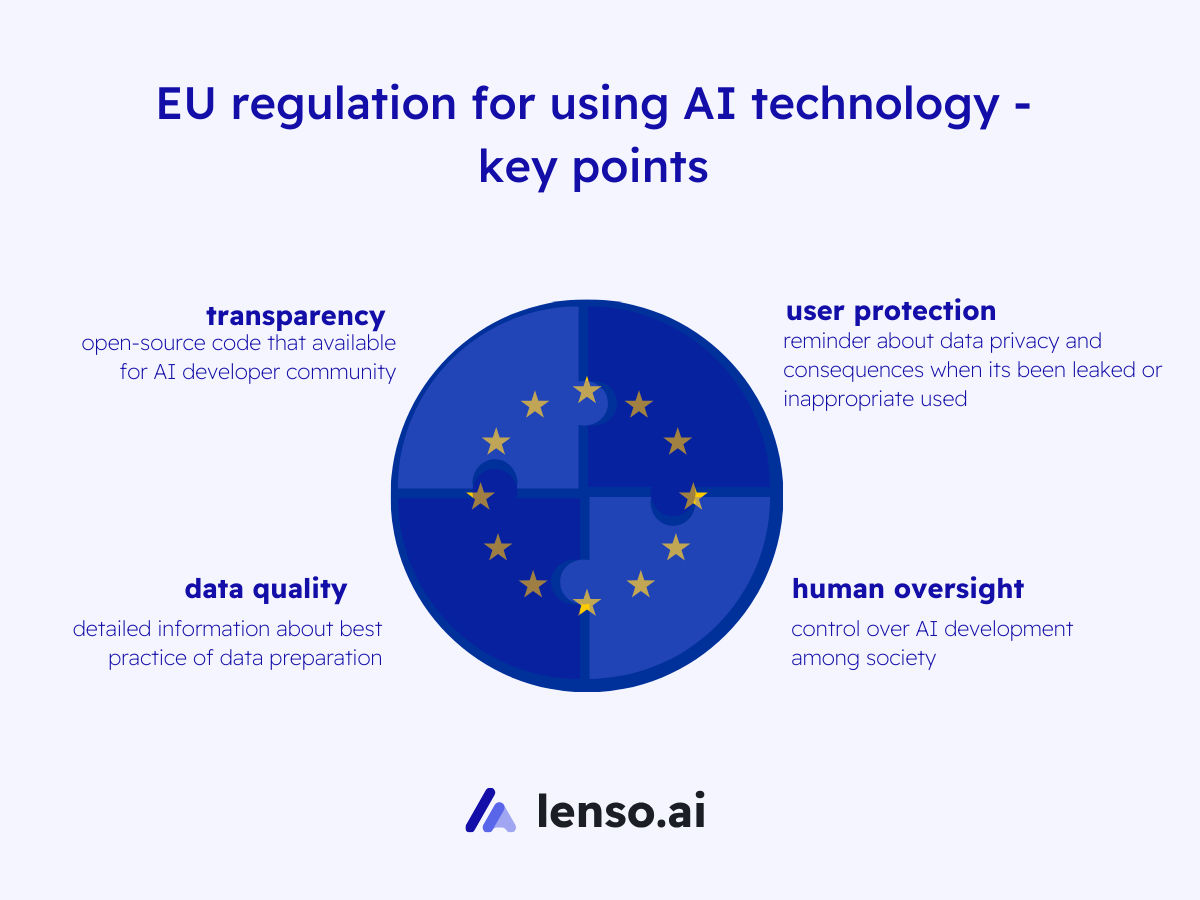
Preview in:
AI technology has extremely evolved over the past few years, and as any other innovation it should correlate with public and government acceptance. That is why it is crucial to provide and adapt regulations that will set up some boundaries and at the same time will not be an obstacle for developers.
What is the EU’s Artificial Intelligence Act?
The European Commission published the first act in 2021, where it explained the basis of AI usage and responsibility for possible upcoming dangers. Beside that, it was emphasized that any AI technology that will (or already) appear in the European Union should be developed with whole responsibility and awareness of social impact and be respectful toward values and rules that endure in Europe.
Over the years the document has been updated several times, and the last publication was in 2023. Such adaptations are inevitable, because AI technology is still ongoing.
That is why there is a plan to conduct an uniform AI law portal, where everyone can check the newest update and fit it up to their own business regulations. Additionally, there will be availability to send complaints about AI systems that misused and affected their data.
EU regulation for using AI technology - key points
Theoretically, EU regulation must include detailed explanation of proper using AI technology, such as:
- transparency: open-source code that available for AI developer community
- data quality: detailed information about best practice of data preparation
- user protection: reminder about data privacy and consequences when its been leaked or inappropriate used
- human oversight: control over AI development among society
- accountability: accept responsibility for actions and decisions

Beside that, there is a huge aspect of AI ethics and its basic requirements.
Also, the document should disclose 4 level risk of using AI technology:
- Unacceptable:
- Cognitive behavioral manipulation of people or specific vulnerable groups
- Social scoring: classifying people based on behavior, socio-economic status or personal characteristics
- Biometric categorisation of people
- High
AI systems that falling into specific areas that will have to be registered in an EU database:
- Management and operation of critical infrastructure
- Education and vocational training
- Employment, worker management and access to self-employment
- Access to essential private services and public services and benefits
- Law enforcement
- Migration, asylum and border control management
- Assistance in legal interpretation and application of the law.
- Limited
- Disclosing that the content was generated by AI
- Designing the model to prevent it from generating illegal content
- Publishing summaries of copyrighted data used for training
- Minimal
The law aims to offer start-ups and small and medium-sized enterprises opportunities to develop and train AI models before their release to the general public.
Additionally, each of the level risks must contain specific information/documentation about the evaluation process and examples of good practices such as:
- rigorous testing
- proper documentation
- clear business goals
- data protection
Consider whether the AI ethics is a necessity in a modern world?
Also, regulation may contain detailed instructions of AI implementation (“dos and don'ts”), that is compliant with EU principle law.
As soon as regulation will be on the final stage, the EU committee also plans to provide fees for companies/developers which misused AI technology or led to the society threatness on a massive scale.
What is next?
Firstly, regulation should be voted on and accepted in the EU committee. Unfortunately, such debates often last for months or even years. The next step contains regulation implementation in each European country.
After that, companies/developers will have 2 years to update their regulations and services to the new standards. And only after another 6 months, the government will check and ban AI services that did not apply for the new law.
Why should such regulation be provided?
First of all, currently AI technology is only partially regulated, and there are still some aspects that remain under the law. From one point of view, it opens a bunch of possibilities for developers. But unfortunately, in the wrong hands such freewill could be used as a weapon. And it could put at risk the whole process of data protection.
Apart from that, the following statement should be considered:
- Protection of fundamental human rights: privacy, non-discrimination, and autonomy.
- Safety and reliability: regulation can establish standards and requirements for the safety and reliability of AI systems.
- Transparency and accountability: requirements for explaining AI decision-making processes, disclosing data sources and training methods, and assigning responsibility for AI-related outcomes.
- Ethical considerations: AI raises various ethical concerns, including issues related to fairness, bias, accountability, and the impact on jobs and society.
- Promotion of innovation and competitiveness: clear and consistent regulation can provide certainty and confidence to businesses and consumers. It can also help ensure a level playing field for businesses operating in the EU market.
- Global leadership: by developing and implementing robust regulation for AI, the EU can position itself as a global leader in responsible AI governance.
Continue reading

General
Top 6 Reverse Image Search Websites for Face Recognition in 2026
If you find yourself struggling to find the perfect reverse image search engine that supports face recognition, you’re in the right place. Here are our top 6 picks.

General
Visual Intelligence: Using AI Reverse Image Search to Drive Sales and Market Share
The era of exclusively text-based searching has ended. People now upload screenshots, crop product photos, and snap pictures of storefronts. The image has become their search query.

General
List of All Tools for Finding Similar Images in 2026 (Search by Image)
Looking for similar images online? Here’s the list of all the similar image search websites - fast, reliable and accurate image search engines. Check which tools you can use for searching for photos on the internet.

